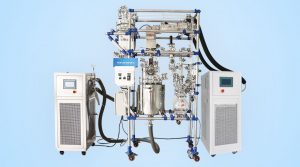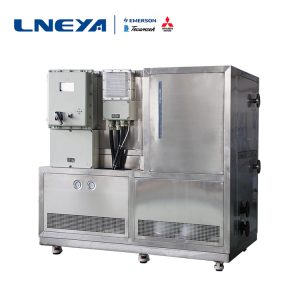Which reactions need temperature control in the process of chemical and pharmaceutical production?
Precise temperature control plays a crucial role in the reaction process during synthesis/crystallization in the production of chemical and pharmaceutical products. In the field of fine chemicals, many chemical reaction processes and crystallization processes are carried out in a low temperature environment. When the reaction is carried out in a low temperature environment, the amount of impurities produced is obviously reduced, and the purity of the product is increased, so that the reacted product has a high selectivity. Compared with the traditional process technology, a reasonable selection of the working temperature range can improve product quality and synthesis quality, improve production efficiency and reduce production costs. The premise of realizing all this is the control of the dynamic temperature in the reaction process. In the crystallization process of pure product, in order to obtain higher product quality, it is necessary to strictly follow the specified cooling rate.
Decarboxylation is a chemical reaction that removes a carboxyl group and releases carbon dioxide (CO2) and replaces it with hydrogen atoms. The term refers to the states of reactants and products. Decarboxylation is one of the oldest known organic reactions because it usually requires simple pyrolysis and distillation of volatile products from the reactor. Heating is required because the reaction is less favorable at low temperatures. Yield is highly sensitive to conditions. For example, the temperature required for the polar activated decarboxylation reaction method is as high as 140 °C.
Winterization is one of the methods of crystallization separation. It is to stir the oil slowly, control the cooling speed, and cool it to about 4~6 ℃. The solid fat is formed into larger crystals and separated out. Winterized oil is characterized by passing the freezing test, that is, it is not cloudy after 5.5 hours at 0 °C. Another example is that the whole process of enzyme extraction is kept at low temperature because enzymes are proteins. Proteins are denatured at high temperatures, thereby losing their activity. The temperature is too low, which is not conducive to the extraction operation. So careful temperature management in the processing plant not only ensures high extraction rates, but also efficient recovery of the solvent used. It is conceivable that temperature control plays a decisive role in the extraction process.
Our LNEYA temperature control system equipment can be used to accurately control temperature in small laboratory rotary evaporators to large factory pilot systems. Temperature control range -120℃~350℃, efficient production stability and repeatable results, refrigeration power from 0.5~1200kW. Superior performance, high precision plus or minus 0.1 ℃, high intelligent temperature control settings, 7-inch 10-inch color TFT touch screen graphic display.
Recomendaciones relacionadas
-
The Following Works Should Be Done Before Starting Industrial Chillers
16022. For the compressor unit with water system, carefully check whether the cooling water system and chilled water system have water, and whether the water pressure is normal, whether the pipeline system of cooling water and chilled water is unblock...
Ver detalles -
How to choose the optimal chiller solution?
1509Choosing a water chiller is like finding a "target" for an enterprise's production equipment. It must not only be "like-minded", but also "be well-matched". The one that suits you is the best. If the choice is not good, either the cooling effect ...
Ver detalles -
TCU temperature control model selection and technical parameter description
2207TCU temperature control is also a two-cycle unit single-fluid temperature control system. When selecting the model, it is very important for the whole temperature control reaction. Only the appropriate reaction system is used to exotherm and absor...
Ver detalles -
Descripción del lubricante del sistema de refrigeración por circulación del motor eléctrico LNEYA
1725Electric vehicle motor circulating cooling system is used in new energy vehicle battery testing. So the performance requirements are very high. Among them, the lubricating oil of the electric vehicle motor circulating cooling system has a certain ...
Ver detalles
 LNEYA Enfriadoras industriales Fabricante Proveedor
LNEYA Enfriadoras industriales Fabricante Proveedor













